Equitable Access to Entrepreneurship for Immigrants and Refugees
By Audrey Barbakoff, Community Engagement and Economic Development Manager, King County Library System
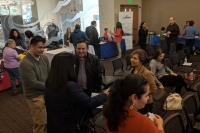
Photo credit: Thomas Swaner
“¡Bienvenidos! Welcome!” As Latinx entrepreneurs began trickling in to the library meeting room, staff greeted them warmly. The smell of coffee and freshly baked empanadas lured people to the refreshments, where they chatted while looking over the room. Parents quickly spotted the children’s corner, and sent kids over to make alebrijes (Mexican folk art sculptures of mythical creatures) out of paper towel rolls. In the center of the room, auditorium-style seating was set up for some upcoming activities — a panel discussion of successful Latinx entrepreneurs, brief informational pitches from nonprofits with helpful resources and elevator pitch practice. But first, people had a chance to network. Around the edges of the room and spilling out into the hallway, a dozen organizations were hosting tables with representatives, information, activities and treats. All of them shared a common goal — to support Latinx and Spanish-speaking entrepreneurs. And every one of them had participated in designing the activities that were taking place that Saturday morning in Burien.
This event, We Mean Business! / Negocios Redondos: Empowering Latinx Small Businesses and Nonprofits, was one element of a larger effort at KCLS to holistically support entrepreneurs who are immigrants and refugees. While the event was important and successful, the real takeaway was the underlying process we used to develop it. How did we arrive at this particular set of events and people?
Over the previous year, as part of the ULC Strengthening Libraries as Entrepreneurial Hubs cohort, KCLS had been getting to know our immigrant and refugee entrepreneur community. We conducted key stakeholder interviews; read documents generated by our communities outlining their economic goals, challenges and realities; attended community meetings; and collaborated with newcomer entrepreneurs and organizations that serve them. The resulting set of guidelines for how KCLS can best serve immigrant and refugee entrepreneurs became a key focus of the library’s overall economic empowerment framework.
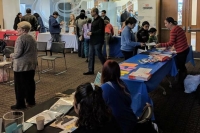
Photo credit: Thomas Swaner
The Foundation – Community-Centered Learning
I believe that the most impactful library service happens when you engage the community you want to serve by co-designing your services with partners from that community. Don't just invite them to the table once your initial planning is done — work together from the beginning to build the table. Make race and social equity assessment a regular part of your planning. Before implementing a program, consider who specifically it will burden or benefit, and how you will address those impacts. Although KCLS is a large library system, any library can do this, regardless of size, location or resource levels.
A community-centered, asset-based approach is especially important when working with marginalized and vulnerable communities. These communities already have their own ideas, solutions and leaders, which are just as good or better than those a library might invent to offer them, but they are working within a system that does not provide equitable opportunities and resources for them to succeed. Unlike traditional deficit-based service models, which view marginalized communities as needy and the role of the institution as suppliers who fill those needs, an asset-based perspective applies an equity lens. It recognizes that underserved communities do not need the predominantly white institution of the library to create new solutions for them based on our own assumptions, without their input and involvement. Instead, our communities need us to fulfill our enduring social role — of leveling the playing field, of providing a fair platform for people to achieve their own dreams.
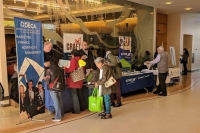
Photo credit: Thomas Swaner
Lessons Learned and Applied
As a result of this process, KCLS developed an economic empowerment framework that included a service strategy for entrepreneurs who are immigrants and refugees. Specifically, we will focus on microbusinesses (those with fewer than five employees) looking to expand. Additionally, we will develop our resources in the food, construction and technology sectors. These decisions are particular to what we learned from our community, and the same process would likely lead other communities to different conclusions. However, some overall lessons were so powerful that I believe they are likely to be broadly true. I will explain these in more detail, and also provide examples of how we put them into practice in the We Mean Business! / Negocios Redondos event.
Content is not king — relationships are. Having the right content to support knowledge about starting and running a business is important to any entrepreneur. But in serving immigrant and refugee communities, having the best content without meaningful relationships is a recipe for mediocre engagement at best.
When books or databases aren’t used, or programs aren’t well-attended, public libraries may assume that our audience does not want this content. But as KCLS learned more about the entrepreneur support organizations serving the Latinx community, we found that library was already offering the right types of information. What we lacked — and existing successful organizations had — was a deep relationship of trust and mutual support based in shared culture. Until the library’s staffing fully represents the makeup of its community (and even then), we need to center partners from within the community in order to effectively connect people to our resources.
In the Negocios Redondos event, we involved a large number of partners from the very beginning. Before making any concrete plans, we reached out to members of the community to ask them what they would want a Latinx entrepreneur-focused event to involve. Our partners explained the kinds of activities and information that would be most helpful for themselves and their community, from broad philosophies to specific logistics. Most agreed to participate in the event as well. Library staff served as a convener, by utilizing our relationships and network to bring together a variety of stakeholders who might not otherwise be connected. We also served as a support system, providing space and promotional materials, handling planning and setup logistics, etc. Our role was not to be subject matter experts, but to build a platform for our Latinx entrepreneur community to accomplish their own goals in their own ways.
Serve the whole person. Entrepreneurs are whole people, balancing family, school/careers and personal lives with their business aspirations. Newcomers to the country are also adjusting to a new home in every sense of the word. The standard library practice of focusing on only one element of a person’s identity or experience at a time, strictly separating our programs and services by topic or age, is an artifact of our own culture. Expecting the same person to come to the same location at different times and wearing different hats — with children at storytime in the morning, without them at a business plan class at night, behaving and dressing differently at a cultural/social vs. a professional event — is not intuitive or welcoming to many. To authentically and equitably invite in people from a variety of backgrounds, we must break down these artificial silos.
In practice, the We Mean Business!/Negocios Redondos event was conceived as both a professional and cultural program. It celebrated National Hispanic Heritage Month, and the planning and marketing focused as much on the celebration of Latinx culture and heritage as it did on entrepreneurship. We incorporated culturally relevant food, crafts and activities throughout the event. To respond to the linguistic needs of the group, we prepared to be flexible with a mix of English, Spanish and bilingual presentations, so both monolingual and bilingual speakers would feel comfortable.
The event also welcomed the entire family. While a business or entrepreneurship program in libraries would traditionally be limited to adults only, we observed how Latinx-led entrepreneur support organizations handled this differently, and adopted their model. Children were explicitly welcomed, and age-appropriate activities and refreshments were provided in the same room with their parents. As a result, not only did entrepreneurs bring their children, they brought several generations of family and friends, including their older parents and similarly-aged peers.
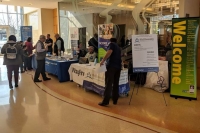
Photo credit: Thomas Swaner
Conclusion
As part of the ULC cohort, KCLS systematically engaged our community to learn about the aspirations of entrepreneurs who are immigrants and refugees in our service area. As part of the overall KCLS economic empowerment framework, we developed a strategy for how we can best serve them at the library. We piloted an event to test some of that strategy in practice, We Mean Business! / Negocios Redondos: Empowering Latinx Businesses and Nonprofits.
The overarching lesson we learned was the importance of building relationships that center the ideas, assets, aspirations and culture of the community we want to serve. Availability of resources alone is not enough. True equitable access to information happens only when it is mediated through networks of trust, shared in ways that are culturally contextual and relevant. Since immigrant and refugee entrepreneurs are extremely diverse, the specific services that result from this approach may look different in every community. But in all cases, building such networks takes time, cultural competence and cultural humility.
Audrey Barbakoff is the community engagement and economic development manager at King County Library System in Washington State. She is a 2013 Library Journal Mover & Shaker and the author of Adults Just Wanna Have Fun: Programs for Emerging Adults (ALA Editions, 2016).
Related Articles
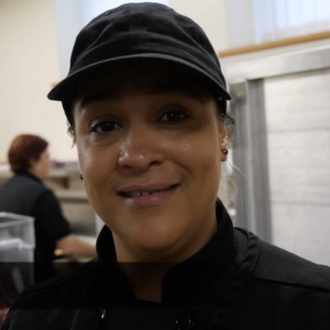
Revisiting 2018 Top Innovators: Immigrant Career Pathways
Hartford Public Library
ULC reached out to Hartford Public Library's Project Coordinator Beverly Redd to follow up and learn about how the Career Pathways program has evolved in the year since its Top Innovator win.
Learn More
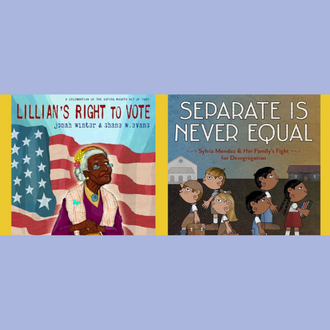
Picture Books Can Open Doors to Tough Topics
Anti-Defamation League
Discover how libraries can use picture books to convey important lessons about aspects of identity and the diversity of our society, how to be inclusive, the ways in which bias and injustice permeate our lives and institutions and how to stand up for equity and justice.
